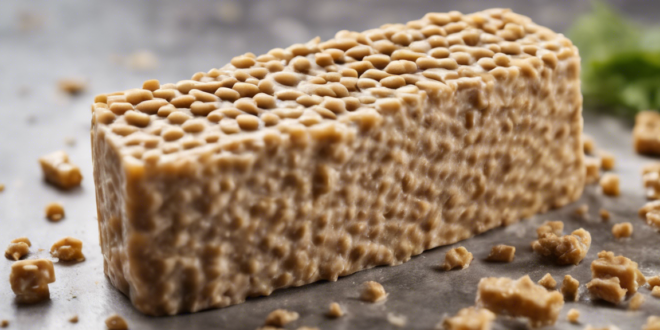Tempeh: The Overlooked Protein Powerhouse in the Alt-Meat Revolution
In the ever-evolving landscape of plant-based proteins, tempeh has quietly emerged as a nutritional superhero, often overshadowed by flashier meat alternatives. Registered dietitians are now championing this traditional Indonesian food as a superior choice for health-conscious consumers seeking sustainable, nutrient-dense protein sources.
What Exactly is Tempeh?
Tempeh is a fermented soybean product with roots deep in Indonesian culinary traditions, dating back centuries. Unlike tofu’s soft, smooth texture, tempeh presents a firm, cake-like consistency with visible whole soybeans, creating a unique protein experience that stands out in the plant-based protein market.
Nutritional Profile: Why Tempeh Deserves Your Attention
Nutritionists are increasingly recommending tempeh for its exceptional nutritional credentials. A single serving (approximately 3 ounces) delivers an impressive nutritional punch:
• 16-18 grams of complete protein
• 9 essential amino acids
• Significant levels of iron, calcium, and magnesium
• Probiotics from the fermentation process
• Low saturated fat content
• Approximately 160-190 calories per serving
The Fermentation Advantage
The fermentation process sets tempeh apart from other soy products. During fermentation, beneficial bacteria break down complex proteins and reduce phytic acid, which typically inhibits nutrient absorption. This means the nutrients in tempeh are more bioavailable and easier for the human body to digest compared to unfermented soy products.
Health Benefits Beyond Basic Nutrition
Research suggests tempeh offers multiple health advantages:
1. Heart Health Support
Tempeh’s unique composition helps lower LDL cholesterol levels and supports cardiovascular health. The plant sterols and soluble fiber contribute to improved heart function and reduced inflammation.
2. Digestive System Enhancement
The probiotic nature of fermented tempeh promotes gut microbiome diversity, potentially improving overall digestive health and immune system function.
3. Sustainable Protein Alternative
With a significantly lower environmental footprint compared to animal proteins, tempeh represents an eco-friendly protein choice that doesn’t compromise nutritional value.
Culinary Versatility: More Than Just a Meat Substitute
Unlike some processed meat alternatives, tempeh offers remarkable culinary flexibility. Its firm texture and ability to absorb marinades make it an ideal ingredient across various cuisines:
• Grilled and marinated tempeh skewers
• Crumbled as a taco or bolognese replacement
• Baked and sliced in sandwiches
• Cubed in stir-fries
• Smoked and used in breakfast scrambles
Selecting and Preparing Quality Tempeh
When shopping for tempeh, nutritionists recommend:
• Choosing organic varieties
• Looking for minimal ingredient lists
• Checking for firm texture without gray or black spots
• Storing in the refrigerator
• Steaming or boiling briefly before cooking to soften texture and reduce potential bitterness
Addressing Common Misconceptions
Many consumers remain hesitant about tempeh, often confusing it with other soy products. Unlike highly processed meat substitutes, tempeh is a whole food with minimal processing. It’s not just a trendy alternative but a nutritionally dense protein source with centuries of traditional use.
Environmental and Ethical Considerations
Beyond personal health, choosing tempeh represents a conscious decision supporting sustainable food systems. Compared to meat production, soybean cultivation requires significantly less water, land, and generates substantially lower greenhouse gas emissions.
Incorporating Tempeh into Your Diet: Expert Recommendations
Registered dietitians suggest a gradual approach to integrating tempeh:
• Start with familiar recipes
• Experiment with different marinades
• Try various cooking methods
• Mix with other proteins initially
• Be patient with taste adaptation
Conclusion: A Nutritional Powerhouse Waiting to Be Discovered
As the alternative protein market continues expanding, tempeh stands out as a nutrient-rich, sustainable, and delicious option. Its combination of traditional preparation, impressive nutritional profile, and culinary versatility makes it more than just another meat substitute—it’s a holistic food choice supporting personal and planetary health.
Whether you’re a committed vegetarian, flexitarian, or simply curious about expanding your protein sources, tempeh offers a compelling option that bridges nutritional science, cultural tradition, and modern dietary needs.
 Good Calories Guide GoodCalories Guide focuses on nutrition, healthy eating, and overall wellness. The site offers practical insights into evidence-based dietary practices, including tips for specific lifestyles such as veganism, keto, and family-friendly meal planning. It also addresses unique nutritional needs for individuals with conditions like diabetes or food allergies, while providing quick and accessible recipes to make healthy living a sustainable and enjoyable choice.
Good Calories Guide GoodCalories Guide focuses on nutrition, healthy eating, and overall wellness. The site offers practical insights into evidence-based dietary practices, including tips for specific lifestyles such as veganism, keto, and family-friendly meal planning. It also addresses unique nutritional needs for individuals with conditions like diabetes or food allergies, while providing quick and accessible recipes to make healthy living a sustainable and enjoyable choice.


